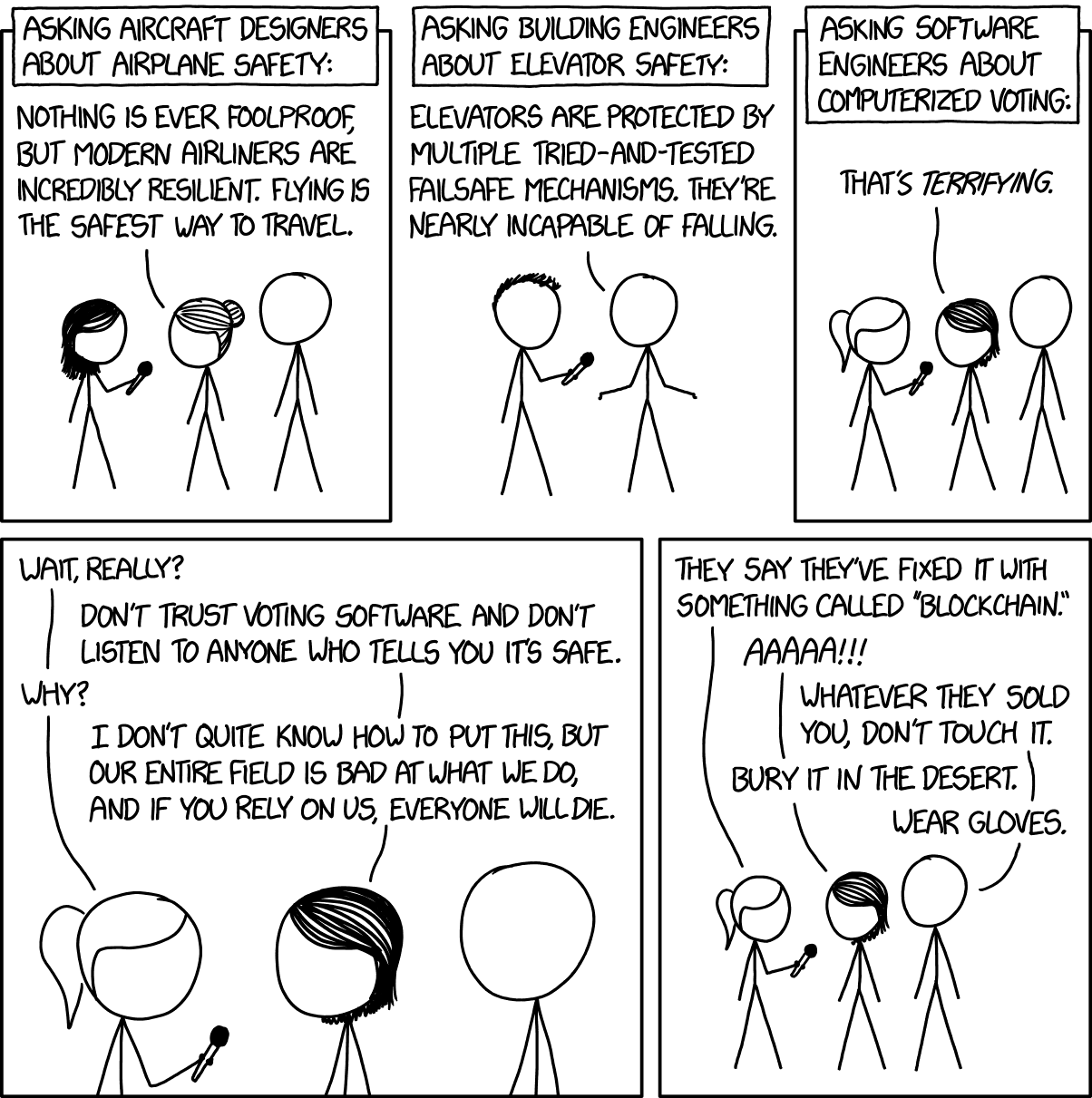https://citizens-initiative.europa.eu/_en, This is the initiative I am talking about. You have to prove you are an EU citizen and then you can sign for the initiatives you want and if a million signatures are reaching within a year then it must be brought to the EU commission.
So if citizens of EU member states can sign online, why can’t they vote online for elections or referendums? If possible, this would decrease the need and power of representative democracy and move closer to direct democracy, which I argue is a good thing
Signing a petition is public, who you cast your vote for is private.
If there were any doubts on the signatures, officials can contact the people who signed and verify that they did sign. How do you verify a secret vote without ruining the secrecy?
I mean you can have online voting if you cast a ballot thats public, and it’d be verifiable, but then we go back to the 1800s in the US where threatening voters is a thing.
You have 3 elements:
1: Internet voting
2: Secrecy
3: Verifiable
Pick 2.
As a counter argument: some countries (like the USA) accept mass mail-in voting, which has the same downsides as online voting (plus the “ballot took five weeks to reach the next town so your vote didn’t count” problem with an underfunded mail service).
Which isn’t to say digital voting is good, but clearly many people value the easier participation over the verifiability/security of normal voting.
Each country within the EU is responsable for their voting system and each country has their own and most are exclusively offline. The EU initiatives is an EU system and has nothing to do with the countries voting systems.
because it’s much less important and so much less risky
Relevant xcdc https://xkcd.com/2030/
Haven’t seen one of these in a while.
It’s fine, the blockchain is now augmented with some AI and runs serverless in the cloud!
Can we slap on some augmented reality, IoT, big data and sprinkle some quantum encryption on top? After that, it should tick all the boxes. ✅
There is something people here didn’t mention yet, the vote is secret for many reasons, one of them is that you can’t get a receipt that you voted for one party and then use that to get paid or rewarded.
By voting online it’s not possible to keep the vote secret as there are always ways to prove without a doubt for a certain party.
Because
A: electronic voting is an awful idea in so many ways
B: direct democracy is an awful idea in so many ways
C: voting is supposed to be secret which the petition signaures aren’t
Because the entire idea of online voting is terrible and we should never ever ever do it except when it’s to name a boat. This is coming from a dev and sysadmin, we are the people who know and we are telling you it’s a terrible idea.
Estonia has online voting
I never knew. Thanks for answering!
I found this video explaining the process: https://www.youtube.com/watch?v=a0zHU4E1XaE&t=123s
I would love to hear any Estonians experience here actually using it
It takes like 5 minutes to vote and so far it has worked without issue. The same digital ID system is used for digitally signing documents, banking, medical history etc as well.
Because signing a petition isn’t voting. First and foremost voting should be anonymous. Secondly voting should be secret. Combine these with online voting from an unsecured location where your spouse could coerce you into voting for their candidate and it becomes a security nightmare.
On top of that voting should be transparent. With simple paper ballots any child, idiot and elderly person, every citizen can understand how it works. YOU can keep an eye on the whole process to make sure everything is counted and reported correctly. This isn’t a theoretical possibility. People actually do that. And that way irregularities do get spotted.
Don’t mail in voting concepts kind of contradict a lot of these points?
Mail in votes requires physical access to tamper with, anyone in the world can hack an internet connection and tamper with online votes.
You could summarize the whole transparency thing into just one word: trust. As long as people trust that everything is fine, the society can continue to function. When people loose trust, everything falls apart.
If you can convince millions of people that the voting system works and is fair, you can have a democratic society. If not, you might want to look into alternatives such as totalitarian dictatorship, monarchy or even post apocalyptic absolute chaos.
Simple clear ballots right!?

Although yeah I agree with most of the points.
Well, we do know that the US isn’t a functioning democracy.
child
Obviously babies cant vote but i find it weird how zionist we are about a magic age number to mark full maturity.
We allow demented elders to become president so why not also lets kids vote, its their future.
Because not all kids know better and are far more gullible than the average adult
Yes, because surely all adults know better, that’s why they so frequently swallow propaganda and vote against their own interests.
It’s controversial and it has its own problems with enforcement, but it often seems like there should be some kind of civics and media literacy test before voting. Of course, whoever is administering the test is going to have their own biases and agendas, so it’s no magic bullet solution.
There’s a vast gulf in maturity between children at different ages, and everyone develops at their own pace. Some thirteen year olds are more mature than many eighteen year olds, and some forty year olds needed more time to cook but they still graduated anyway.
Combine these with online voting from an unsecured location where your spouse could coerce you into voting for their candidate and it becomes a security nightmare.
Uh like postal voting from home? This should not be a serious concern.
It is still a valid concern here and it’s why we still vote physically.
We also put our paper choice in a envelope, operation done from a one person polling booth. People in the voting room make sure everyone, including couples, are not watching or forcing a choice to another.
The vote is always done the Sunday to give the time for the most people to go voting (a lot of enterprises and shops are closed the Sunday). And if you work, your boss can’t block you to leave few hours for voting.
While I love the theoretical idea of direct democracy, the EU is supposed to address high level issue with generic directive.
So complex laws on complex topics. Do you know the details of directives like reach? (and typical lemmy audience has more chance to understand REACH over finance) Do you know the details about every chemical substance allowed/banned? Even good faith politicians end up believing lobbyists, imagine a regural person without a team of assistant
Direct democracy is great, but the EU is a too generic level for it to work
Voting from home makes voting under duress easier, which is a think I’d argue that should be avoided.
Mail in voting…
Which works well and should be kept, but it has similar issues with coercion.
Electronic being traceable.tl the individual voters at scale is the bigger issue .
I hadn’t consider that. I wonder if there is a way around this. Thanks for the answer!
As for voting under duress, it’s also a concern with mail in ballots and voting by phone. It can be worse with online in the same way that scams are easier online.
I know someone who voted by phone this recent election in my home province, and they were eligible to do so because of sudden health issues. The phone call included multiple people who verified their information, took down the vote, and then verified the vote. I imagine something would get flagged if there was any discrepancy.
I’d also like to link to this Tom Scott video
Why Electronic Voting Is Still A Bad Idea: https://youtube.com/watch?v=LkH2r-sNjQs
The strongest argument for me: trust
Even with our paper ballots, hand counting, and many checks along the way, people now have doubts about the accuracy of the results. No matter how good the tech is, it will be impossible to convince the general public that the online votes are accurate.
Also this classic xkcd

Also this classic xkcd
Oh no. Are you telling me that an xkcd numbered in the 2000s is a “classic” now? Yikes
An xkcd becomes a classic when people use it a lot.










